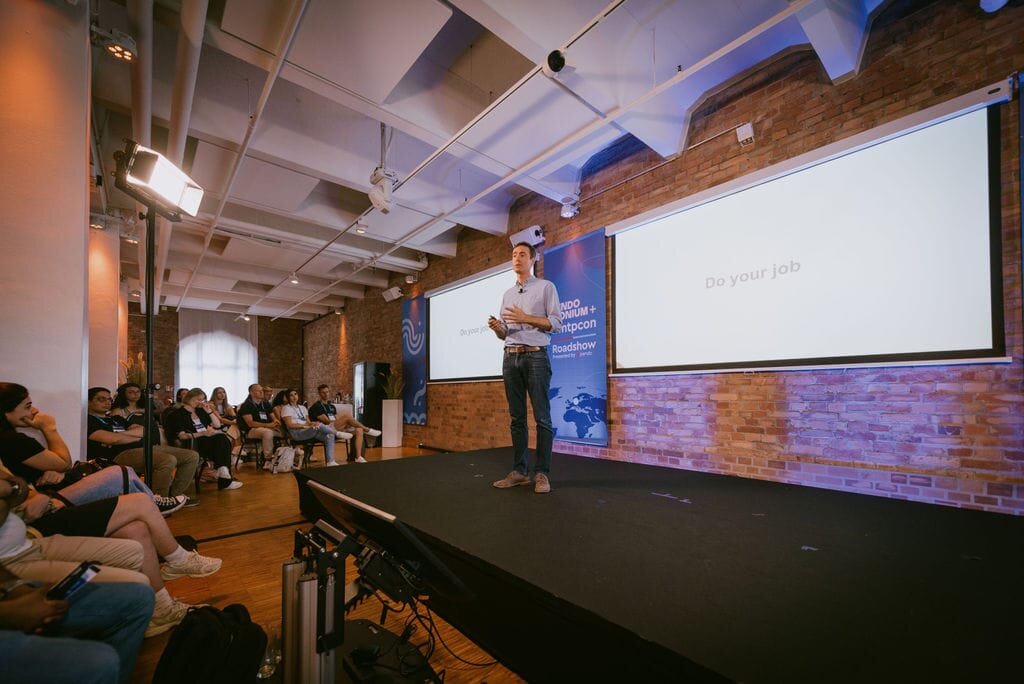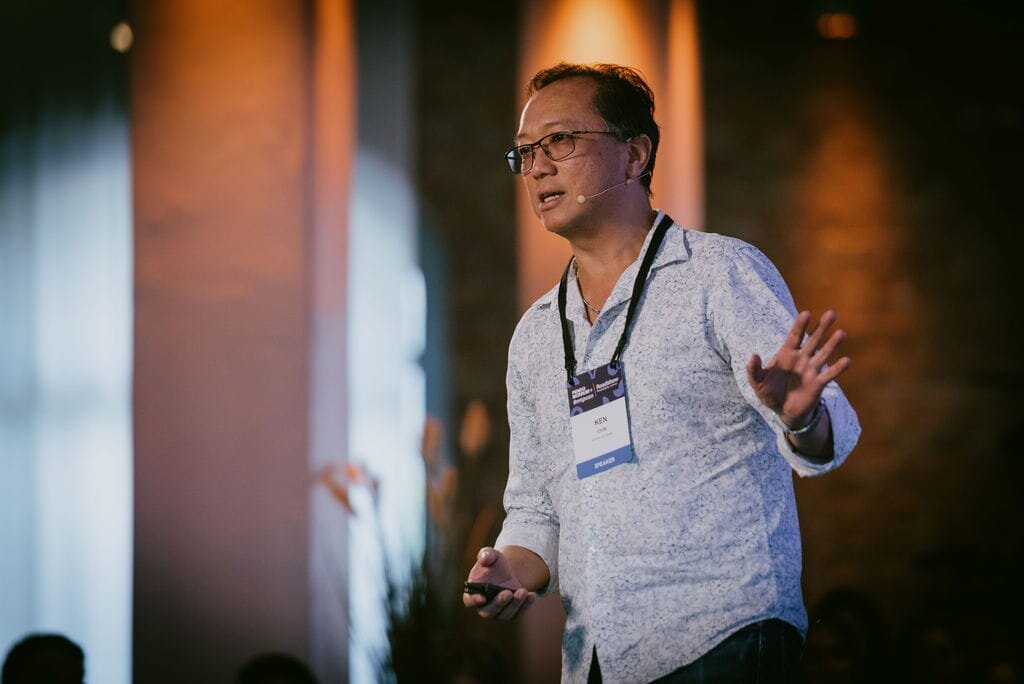Our final stop at the Pendomonium+#mtpcon roadshow was the wonderful Spreespeicher in Berlin. There, we were inspired by some great talks and panels, ranging from talks on UX to lessons in leadership. Read on for our key takeaways from our final stop in Berlin!
Earn the trust of your users
In the opening keynote for the day, Andrew Martinez-Fonts, VP of Product at Honeysales, emphasised the importance of using AI to create value and delight customers. "Delight customers with AI in hard-to-copy margin-enhancing ways." This involves understanding customer problems deeply and integrating AI in ways that are difficult for competitors to replicate.
Andrew highlighted the need to define a solid product strategy that aligns with the overall company strategy: "A good product strategy derives from company strategy, connects to division strategy, group strategy, then team strategy." With AI going through multiple hype cycles, it’s crucial to stay focused on core principles. "We’re starting to understand the boundaries of AI and what we can do with it."

Lean on internal and external expertise
In a panel discussion featuring Mirela Mus, Founder and CPO of Product People, Navid Heidemann, Head of Product at cplace, Jordy Jordan, Global Senior Director of Product at Hello Fresh, Tetiana Golovchenko, Director of Product Data & AI at Merck Group, moderated by Randy Silver, Product Leadership Coach and Co-host of The Product Experience podcast, they discussed the importance of combining internal knowledge with external expertise when dealing with AI. Navid stated, "There is a lot of excitement and interest. It is good to have a management of influence in AI positivity that helps to innovate on the ground." This balance ensures AI strategies are technically sound and aligned with business goals.
Jordy added, "Figure out the blast radius and be confident in the output you’re creating, which you and your customers have come to expect." Tetiana emphasised rapid experimentation and education:
Experimentation is very fast. You must start with it to understand how that technology works.
Tetiana Telenczak
Every journey starts with a goal
In his keynote talk, Javier Andrés Bargas-Avila, Google's UX Director, explained a framework for making products more user-centric, focusing on user-centered design. He also discussed transitioning teams to UCD by emphasizing research, collaboration, and design.
Every journey starts with a goal. Think about the mind of a user.
Javier Andrés Bargas-Avila
Javier stressed the importance of defining the core needs of users rather than just focusing on features. This approach helps teams think of innovative solutions. He also emphasised mapping tasks to goals and understanding critical user journeys (CUJs) and shared responsibilities aimed at changing product perspectives to be more user-focused.
Following this was a panel session moderated by Nacho Bassino, product leadership coach, featured Arne Kittler, CPO at Facelift, Kristen Waeber, Director of Product at N26, Azucena Barron Medina, Director of Product at Delivery Hero, and Piet Smet, Product Manager at Cleverbridge. The panel discussed several key aspects affecting product teams today. Piet noted that product managers now have more control and are counted on to validate stakeholder opportunities and company prospects.
We learned that positive change should focus on outcomes and achieving alignment within the team. Azucena pointed out that there is increasing pressure to be customer-focused and obsessed, alongside being technically skilled. This shift reflects an evolution in the role of product managers.
However, Arne warned that some companies are reverting to a "feature factory" approach with more top-down control. Kristen advocated for faster learning and experimentation by shipping products quickly and learning from users' feedback. She also emphasised the value of regional expertise and investment in AB testing to understand experimentation at scale.
Stay curious about AI
In the penultimate keynote for the day, Trisha Price, CPO at Pendo, discussed how AI is reshaping product management, urging a shift from a feature-focused approach to one emphasizing business outcomes.
She highlighted the need to stop ignoring feedback, spending excessive time manually triaging it, and using non-collaborative tools for creating roadmaps. Instead, she emphasized leveraging AI to drive value, prioritize speed and agility, and ensure AI features solve genuine user problems, acting as "painkillers" rather than "vitamins." She acknowledged the overwhelming pace of industry changes but stressed the importance of adapting and remaining curious about new developments.
Our world has changed so much and I don’t see things slowing down. Let’s stay curious.
Trisha Price
You’re not as competent as you think you are
Closing out the day was Ken Chin, CPO of Spark Networks, who offered valuable advice on advancing a career in product management. He emphasised the importance of continuous learning and understanding key principles and frameworks. "The pace at which you learn determines how far you can go in your career," he remarked. Ken stressed the significance of commercial acumen, noting that career progress is closely tied to the company's success.

He advised getting close to the revenue model and understanding the business's financial mechanics. Ken also highlighted the importance of strategic thinking, involving answering two fundamental questions: "Where do we play?" and "How do we win?" These questions should be addressed at both company and product levels. He encouraged product managers to engage in strategic debates with their teams. According to Ken, the real success lies in execution.
All problems are people problems, and understanding human behaviour is crucial, he noted. Leadership, Ken said, is about character, authenticity, and courage. Building trust is essential, and product managers must support their teams, especially when they fail.
And just like that, our three stops in London, Amsterdam, and Berlin were done! Throughout the three events, we were inundated with product goodness and had plenty of opportunities to network, learn, and grow as product people. Stay tuned for dedicated write-ups of all of the panels and talks in the coming weeks!
Read recaps of our stops in Amsterdam and London below







